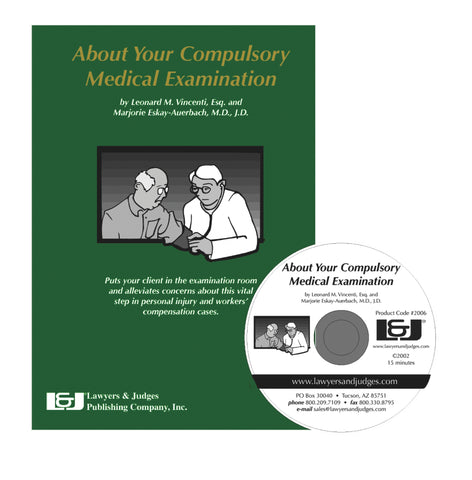
Deposition Dissection: A Handbook for Doctors Facing Deposition
- Author: Susanne Moore
- ISBN 10: 1-930056-55-9
- ISBN 13: 978-1-930056-55-8
- Copyright Date Ed: May 16, 2005
- Pages: 176 pages
- Binding Information: Paperback
- Size: 6 ✕ 9 Inches (US)
Full of sample questions, strategies, and explanations, Deposition Dissection is an essential manual for any healthcare provider facing the looming threat of a deposition. In an easily readable format, the book reveals opposing counsel’s specific objectives and tactics, explains how your deposition fits into the big picture of a lawsuit, and empowers you with the tools to give a strong, defensible deposition. Chapters on serving as an expert witness, practicing defensive medicine, and the implications of tort reform bring you up to date on today’s legal trends in medicine. The book contains questions and references from actual cases, and will help you prepare a shorter, stronger deposition that will stand up during trial.
This book is also available as an E-book. Click here to purchase and download:
Topics include:
- What is a deposition?
- What is a deposition not?
- What topics will be covered
- Your role
- Your attorney’s role
- Questions and Answers
Table of Contents
Disclaimer
Introduction
Chapter 1: Good Doctors Don’t Get Sued, Do They?
1.1 Understanding the Lawsuit
1.2 The Plaintiff’s Point of View
1.3 The Plaintiff Attorney’s Point of View
Chapter 2: What Can I Expect?
2.1 The Lingo and the Process of Litigation
2.2 Deposition Truths
2.3 Deposition Misconceptions
Chapter 3: Tools of the Trade
3.1 Rules of Deposition—Where and What Are They?
3.2 Types of Depositions
3.3 Plaintiff’s Attorney’s Deposition Goals
3.4 Your Deposition Goals
Chapter 4: Dissecting the Deposition
4.1 Preliminaries—Your Background
4.2 The Four Elements of a Medical Negligence Claim
A. Duty
B. Breach of the standard of care
C. Causation
D. Injury
4.3 The Changing Face of Expert Testimony
4.4 Types of Questioning
A. Hypotheticals
B. Speculation
C. Repetitive questions
D. Harassing questions
E. Narrative questions
F. Manipulation
G. Questions with editorialized facts
H. Questions forcing you to say "Yes" or "No"
I. Compound, ambiguous or vague questions
J. Leading questions
K. Fishing expedition questions
L. Questions to impeach
M. Questions regarding what your trial testimony will be
N. Vicarious liability questions
O. Questions regarding pending or past litigation
4.5 Diagrams or Exhibits
Chapter 5: You Can Control Your Deposition
5.1 Demeanor
5.2 Nonverbal Communication
5.3 Review the Right Documents
5.4 Referring to Documents during the Deposition
5.5 Taking Care of Yourself
5.6 Controlling the Pace
5.7 Conclusion
Chapter 6: Your Attorney’s Role
6.1 Your Deposition Preparation Meeting
6.2 Your Deposition
A. Objections
B. Privileged matters
C. What to bring to your deposition
6.3 How Your Case is Defended
Chapter 7: Technicalities
7.1 The Finer Points
7.2 What Influences a Jury?
7.3 How Will My Deposition Be Used against Me?
7.4 Before the Deposition
7.5 After the Deposition
7.6 Predicting the Future
Chapter 8: To Settle or Not To Settle
8.1 The Factors
8.2 Will My Insurance Coverage Be Enough?
8.3 Realities of Trial
8.4 The Aftermath
Chapter 9: How to Practice Defensive Medicine
Chapter 10: Serving as a Witness
10.1 Is It Safe?
10.2 Serving as an Expert Witness
10.3 Handling Cross-examination
Chapter 11: Changes In the Law
Chapter 12: Grand Rounds (Questions and Answers)
Appendix A: Checklist
Appendix B: Sample Notice of Deposition
Appendix C: Deposition Testimony Examples




